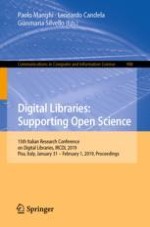2019 | Book
Digital Libraries: Supporting Open Science
15th Italian Research Conference on Digital Libraries, IRCDL 2019, Pisa, Italy, January 31 – February 1, 2019, Proceedings
Editors: Paolo Manghi, Leonardo Candela, Gianmaria Silvello
Publisher: Springer International Publishing
Book Series : Communications in Computer and Information Science
